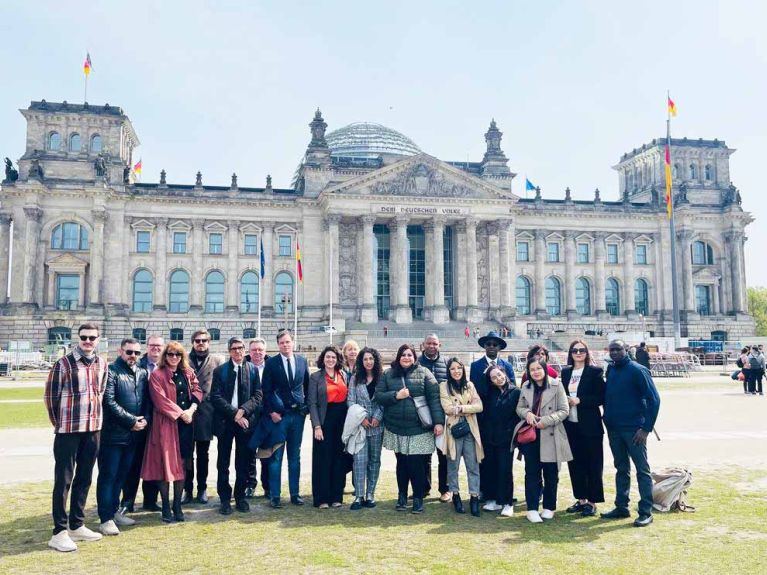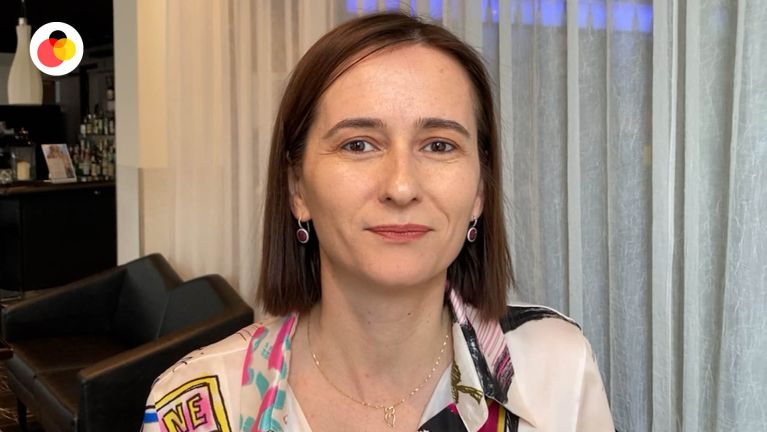Strategies to combat fake news
Disinformation poses a threat to democratic structures worldwide. How can it be combated? This was the topic for a group visit organised by the Federal Foreign Office.

One sunny afternoon in April 2023, a group of international journalists gathered in front of the Berlin studio of Deutsche Welle (DW). Within the framework of the Visitor’s Programme of the Federal Republic of Germany, they had come to the German capital to spend a week exchanging views on a topic that is preoccupying and posing a challenge to media companies around the world: how to deal with disinformation.
After getting to know one another briefly in the morning, many of the participants talked about how democracy was being eroded in their countries and how they were trying to counter this with fact-checking initiatives. Now, however, they are all eager to begin their visit to Germany’s international broadcasting service, which many of the participants value as an impartial source of information in their countries.
Visit to Deutsche Welle
Suddenly a group positions itself in front of the entrance and unfurls a poster. It is emblazoned with the demand: “Stop the Deutsche Welle propaganda in Bangladesh!” The visitors are briefly confused: Why is this broadcaster, which is committed to an independent press worldwide, now being accused of manipulative false reporting?
A short time later, when the visitors have joined DW editor-in-chief Manuela Kasper-Claridge and the presenter Jaafar Abdul Karim in a conference room to discuss the challenges posed by disinformation, the intervention on the street outside is of course one of the topics raised. Abdul Karim explains that the protest is in response to an investigative report by the broadcaster that has raised serious allegations against a special police unit that is under the direct responsibility of the Interior Ministry in Bangladesh: “This is now the response to our work: we are being accused of propaganda. But that’s not all: People who appear in our report as witnesses are being pursued by the police.”
Dieses YouTube-Video kann in einem neuen Tab abgespielt werden
YouTube öffnenThird party content
We use YouTube to embed content that may collect data about your activity. Please review the details and accept the service to see this content.
Open consent formDisinformation as part of the political system
It is clear from this example that things that are perceived to be true in public discourse, and indeed things that are regarded as disinformation, no longer reflect the facts in many regions of the world. This is the consequence of a particular political agenda that is established with considerable effort and financial expenditure. “We have freedom of expression in our country,” one investigative journalist from West Africa reports, “though only so long as our opinions match those of the government. If this is not the case, one is immediately branded an enemy of the state.” His sobering conclusion, which many of his colleagues also see as applying in the same or similar way to their countries, is: Disinformation is no longer just a problem that comes from outside. It is part of the political system that governments themselves use as an instrument of power.
For journalists who have to work under such conditions, this is not only frustrating but in some cases even life-threatening, reports Hala Nouhad Nasreddine, an investigative journalist with the Daraj Media platform in Lebanon. “I remember many colleagues who we have lost in Lebanon, Iraq, Yemen and elsewhere. For us, the issue of combating disinformation not only plays a central role in our work. It is a matter of survival.”
The only question is: How can we achieve this under such conditions? Fact-checking, in the experience of many of the 18 journalists visiting from around the world, is a good thing and indeed vital; however, it is by no means enough on its own to counter the enormous power that disinformation campaigns - especially those on social media - can have. Giovanni Riotta is the director of the School of Journalism and Data in Rome and a member of the Advisory Board of the European Digital Media Observatory (EDMO), whose mission is to combat disinformation. “False information can quickly generate millions of clicks, yet only a few thousand users see the corrected version. In terms of media reach, we are fighting a losing battle here. We urgently need to come up with another approach.”
Anticipating false information
One option might be to direct the focus of individual fake news items to the infrastructures that disseminate them. This shift in perspective is reported for instance by Pauline Claire de Jesus Macaraeg, a journalist with the Philippine news magazine Rappler. “These days, we concentrate our work on the kind of coordinated non-authentic behaviour that can be observed for example on Facebook, the most popular social media platform in the Philippines.”
Another strategy involves not only correcting false information once it has already been published, but anticipating it in advance. Rather than just debunking, this would be a matter of “prebunking”. For Noura Eljebri, a journalist from Libya and editor-in-chief at Tahra Fact Checking, this can be an efficient way to nip false information campaigns in the bud. Following key parliamentary debates, the platform gathers together the most important facts in order to counter any potential false information.
Dieses YouTube-Video kann in einem neuen Tab abgespielt werden
YouTube öffnenThird party content
We use YouTube to embed content that may collect data about your activity. Please review the details and accept the service to see this content.
Open consent formThe participants showed particular interest in Germany’s media system. From Professor Martin Emmer from the Institute for Media and Communication Studies at Freie Universität Berlin, the group learnt about what makes public service broadcasting in Germany special and about its legally enshrined freedom from state intervention. Later in the week, they had the opportunity to observe work at regional broadcaster Rundfunk Berlin-Brandenburg (rbb) at its Potsdam-Babelsberg TV studio. The programme also featured an exchange with the German fact-checking platform Correctiv and the educational initiative Lie Detectors, which aims to improve the media skills of pupils aged 10 to 15.




